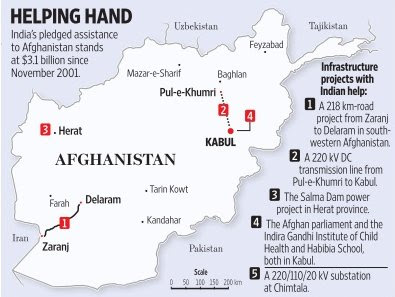International Relations
India’s Afghan Policy and Taliban
- 20 May 2020
- 8 min read
This article is based on “Getting India back to the Afghan high table” which was published in The Hindu on 18/05/2020. It talks about the need to recalibrate India’s Afghan policy, as the Taliban takes the central role in Afghanistan politics.
Recently, the United Nations Secretariat held a meeting of the “6+2+1” group on regional efforts to support peace in Afghanistan. This group includes six neighbouring countries: China, Iran, Pakistan, Tajikistan, Turkmenistan and Uzbekistan; two global players the United States and Russia, and Afghanistan itself.
However, India has not been invited to this peace process. The reason given for keeping India out of this regional discussions is that India holds no “boundary” with Afghanistan. However, the “6+2+1” grouping ignored India’s stand that its territory borders Afghanistan (along Wakhan Corridor) and is currently under Pakistan’s illegal occupation.
Despite all the development work taken up by India in Afghanistan over the past 18 years since the Taliban were ousted from Kabul in 2001, it finds itself on the margins of international diplomacy in Afghanistan.
In this context, there is a need for India to recalibrate its Afghan policy, in order to secure its strategic and economic interest.
India’s Voice in the Afghan’s Reconciliation Process
- In the past, due to terror activities of the Taliban, India has been very critical of the Taliban coming into power and shown resistance to publicly dealing with the Taliban.
- Under the US-Taliban peace deal, the Taliban will be in the centre of power in Afghanistan, as the US forces withdraw from Afghanistan.
- In the present scenario, India has never announced its support for the U.S.-Taliban peace deal. Rather, India supports the Ashraf Ghani government and backs the idea of an Afghan-led, Afghan-owned, and Afghan-controlled process.
- Further, in order to provide legitimacy to recently held Afgan president elections, Ashraf Ghani entered into a power-sharing agreement with former chief executive Abdullah Abdullah.
- This agreement will inevitably further weaken Ashraf Ghani and subsequently undermines Indian interest in the region.
- Due to these factors, India’s voice in the reconciliation process has been limited.
India’s Interest in Afghanistan
- Economic and Strategic Interest: Afghanistan is a gateway to the oil and mineral-rich Central Asian republics.
- Afghanistan's main advantage is its geography, as anyone who is in power in Afghanistan controls the land routes connecting India with Central Asia (via Afghanistan).
- Developmental Projects: The massive reconstruction plans for the country to offer a lot of opportunities for Indian companies.
- Three major projects: the Afghan Parliament, the Zaranj-Delaram Highway, and the Afghanistan-India Friendship Dam (Salma Dam), along with India’s assistance of more than $3 billion in projects, hundreds of small development projects (of schools, hospitals and water projects) have cemented India’s position in Afghanistan.
- Security Interest: India has been the victim of state-sponsored terrorism emanating from Pakistan supported terrorist group operating in the region (e,g. Haqqani network). Thus, India has two priorities in Afghanistan:
- to prevent Pakistan from setting up a friendly government in Afghanistan, and
- to avoid the return of jihadi groups, like al Qaeda, which could strike in India.
Challenges Ahead
India’s Dilemma
Due to the Taliban’s coming to power, India faces a dilemma, between:
- Should India reconsider its current policy that a lasting political settlement in Afghanistan must come through an “Afghan-led, Afghan-owned and Afghan controlled process'' (considering that the elected Afghan Government is hardly in control of the peace process).
- Should India, consider the option of entering into direct talks with the Taliban. But, If India does so, it would constitute a major departure from its consistent policy of dealing only with recognised governments.
Dent in India’s Goodwill
- The building blocks of India's goodwill are assistance in infrastructure projects, health care, education, trade and food security, and also in the easy access to Afghani citizens to study, train and work in India.
- Above all, it is India’s example as a pluralistic, inclusive democracy, inspires many in Afghanistan.
- However, there has been a dent in India’s goodwill, due to recent events in India, especially the controversy over the Citizenship (Amendment) Act, 2019.
Exclusion of India
- India has been excluded from the Afghanistan peace process many times including the recent meeting (6+2+1 grouping).
- This poses a challenge for India to secure its interest in deciding the fate of Afghanistan and its people.
Steps To Be Taken
- India must also pursue opportunities to fulfil its role in the peace efforts in Afghanistan, starting with efforts to bridge the Ghani-Abdullah divide, and bringing together other major leaders with whom India has built ties for decades.
- India should take the diplomatic route to press for its inclusion in “6+2+1” dialogue, to claim its legitimate role in the Afghan peace process.
- India should leverage the United Nations’s call for a pause in conflicts during the Covid-19 pandemic to restart dialogue with Pakistan, which in turn is necessary for lasting peace in Afghanistan.
- Also, India can learn from US-Taliban talks where two opposing parties came to the negotiating table for talks on Afghanistan’s future.
- For India, given its abiding interest in Afghanistan’s success and traditional warmth for its people, making that leap should be a bit easier. Thus, India can consider the appointment of a special envoy and start Track II diplomacy with the Taliban.
Conclusion
In the current situation, it is essential for India to maintain its strong links with the Afghan government, build and support its traditional Afghan allies and open lines of communication with the Taliban.
|
Drishti Mains Question How a recent power-sharing agreement in Afghanistan will impact Indian interests in Afghanistan. Critically analyse. |
This editorial is based on “A Lending Hand” which was published on The Indian Express on May, 19th 2020. Now watch this on our Youtube channel.





